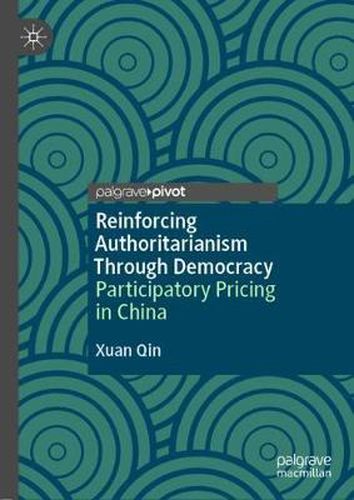Readings Newsletter
Become a Readings Member to make your shopping experience even easier.
Sign in or sign up for free!
You’re not far away from qualifying for FREE standard shipping within Australia
You’ve qualified for FREE standard shipping within Australia
The cart is loading…






This title is printed to order. This book may have been self-published. If so, we cannot guarantee the quality of the content. In the main most books will have gone through the editing process however some may not. We therefore suggest that you be aware of this before ordering this book. If in doubt check either the author or publisher’s details as we are unable to accept any returns unless they are faulty. Please contact us if you have any questions.
This book provides empirical evidence to show how democratic experiments are harnessed to achieve control and support authoritarianism, through the lens of participatory pricing, which is one of the most important forms of deliberative democracy in China. The crucial point is an interlacement of easily perceptible improvement in empowerment (voluntary enrollment, disclosure of information and opportunities for expression during events) and hidden control (delicately designed procedures and pre-existing frameworks that influence participants in how they think, and when they talk).
The mixture of these two mechanisms assures participants and educates them, producing cooperative citizens desired by the government. This is referred to as the partial empowerment strategy, which challenges the traditional assumption of the correlation between deliberation and empowerment. When authoritarian control influences deliberations in a form that obstructs the natural developmental process of empowerment, it acts as a filter that encourages only some form of empowerment, but precludes those that are too risky for the government. This exertion of dominance through a participatory form reflects the development of governance capability of China as a modern authoritarian state and explains its surprising resilience.
$9.00 standard shipping within Australia
FREE standard shipping within Australia for orders over $100.00
Express & International shipping calculated at checkout
This title is printed to order. This book may have been self-published. If so, we cannot guarantee the quality of the content. In the main most books will have gone through the editing process however some may not. We therefore suggest that you be aware of this before ordering this book. If in doubt check either the author or publisher’s details as we are unable to accept any returns unless they are faulty. Please contact us if you have any questions.
This book provides empirical evidence to show how democratic experiments are harnessed to achieve control and support authoritarianism, through the lens of participatory pricing, which is one of the most important forms of deliberative democracy in China. The crucial point is an interlacement of easily perceptible improvement in empowerment (voluntary enrollment, disclosure of information and opportunities for expression during events) and hidden control (delicately designed procedures and pre-existing frameworks that influence participants in how they think, and when they talk).
The mixture of these two mechanisms assures participants and educates them, producing cooperative citizens desired by the government. This is referred to as the partial empowerment strategy, which challenges the traditional assumption of the correlation between deliberation and empowerment. When authoritarian control influences deliberations in a form that obstructs the natural developmental process of empowerment, it acts as a filter that encourages only some form of empowerment, but precludes those that are too risky for the government. This exertion of dominance through a participatory form reflects the development of governance capability of China as a modern authoritarian state and explains its surprising resilience.